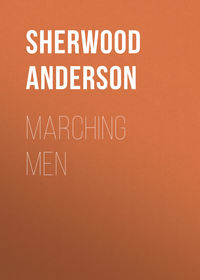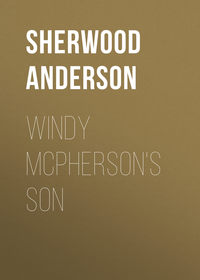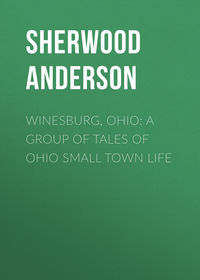 полная версия
полная версияPoor White
The truth is that the people of Mudcat Landing were totally unlike any of the people Sarah Shepard had ever known and unlike the people Hugh was to know during his mature life. He who had come from a people not smart was to live among smart energetic men and women and be called a big man by them without in the least understanding what they were talking about.
Practically all of the people of Hugh’s home town were of Southern origin. Living originally in a land where all physical labor was performed by slaves, they had come to have a deep aversion to physical labor. In the South their fathers, having no money to buy slaves of their own and being unwilling to compete with slave labor, had tried to live without labor. For the most part they lived in the mountains and the hill country of Kentucky and Tennessee, on land too poor and unproductive to be thought worth cultivating by their rich slave-owning neighbors of the valleys and plains. Their food was meager and of an enervating sameness and their bodies degenerate. Children grew up long and gaunt and yellow like badly nourished plants. Vague indefinite hungers took hold of them and they gave themselves over to dreams. The more energetic among them, sensing dimly the unfairness of their position in life, became vicious and dangerous. Feuds started among them and they killed each other to express their hatred of life. When, in the years preceding the Civil War, a few of them pushed north along the rivers and settled in Southern Indiana and Illinois and in Eastern Missouri and Arkansas, they seemed to have exhausted their energy in making the voyage and slipped quickly back into their old slothful way of life. Their impulse to emigrate did not carry them far and but a few of them ever reached the rich corn lands of central Indiana, Illinois or Iowa or the equally rich land back from the river in Missouri or Arkansas. In Southern Indiana and Illinois they were merged into the life about them and with the infusion of new blood they a little awoke. They have tempered the quality of the peoples of those regions, made them perhaps less harshly energetic than their forefathers, the pioneers. In many of the Missouri and Arkansas river towns they have changed but little. A visitor to these parts may see them there to-day, long, gaunt, and lazy, sleeping their lives away and awakening out of their stupor only at long intervals and at the call of hunger.
As for Hugh McVey, he stayed in his home town and among his own people for a year after the departure of the man and woman who had been father and mother to him, and then he also departed. All through the year he worked constantly to cure himself of the curse of indolence. When he awoke in the morning he did not dare lie in bed for a moment for fear indolence would overcome him and he would not be able to arise at all. Getting out of bed at once he dressed and went to the station. During the day there was not much work to be done and he walked for hours up and down the station platform. When he sat down he at once took up a book and put his mind to work. When the pages of the book became indistinct before his eyes and he felt within him the inclination to drift off into dreams, he again arose and walked up and down the platform. Having accepted the New England woman’s opinion of his own people and not wanting to associate with them, his life became utterly lonely and his loneliness also drove him to labor.
Something happened to him. Although his body would not and never did become active, his mind began suddenly to work with feverish eagerness. The vague thoughts and feelings that had always been a part of him but that had been indefinite, ill-defined things, like clouds floating far away in a hazy sky, began to grow definite. In the evening after his work was done and he had locked the station for the night, he did not go to the town hotel where he had taken a room and where he ate his meals, but wandered about town and along the road that ran south beside the great mysterious river. A hundred new and definite desires and hungers awoke in him. He began to want to talk with people, to know men and most of all to know women, but the disgust for his fellows in the town, engendered in him by Sarah Shepard’s words and most of all by the things in his nature that were like their natures, made him draw back. When in the fall at the end of the year after the Shepards had left and he began living alone, his father was killed in a senseless quarrel with a drunken river man over the ownership of a dog, a sudden, and what seemed to him at the moment heroic resolution came to him. He went early one morning to one of the town’s two saloon keepers, a man who had been his father’s’ nearest approach to a friend and companion, and gave him money to bury the dead man. Then he wired to the headquarters of the railroad company telling them to send a man to Mudcat Landing to take his place. On the afternoon of the day on which his father was buried, he bought himself a handbag and packed his few belongings. Then he sat down alone on the steps of the railroad station to wait for the evening train that would bring the man who was to replace him and that would at the same time take him away. He did not know where he intended to go, but knew that he wanted to push out into a new land and get among new people. He thought he would go east and north. He remembered the long summer evenings in the river town when the station master slept and his wife talked. The boy who listened had wanted to sleep also, but with the eyes of Sarah Shepard fixed on him, had not dared to do so. The woman had talked of a land dotted with towns where the houses were all painted in bright colors, where young girls dressed in white dresses went about in the evening, walking under trees beside streets paved with bricks, where there was no dust or mud, where stores were gay bright places filled with beautiful wares that the people had money to buy in abundance and where every one was alive and doing things worth while and none was slothful and lazy. The boy who had now become a man wanted to go to such a place. His work in the railroad station had given him some idea of the geography of the country and, although he could not have told whether the woman who had talked so enticingly had in mind her childhood in New England or her girlhood in Michigan, he knew in a general way that to reach the land and the people who were to show him by their lives the better way to form his own life, he must go east. He decided that the further east he went the more beautiful life would become, and that he had better not try going too far in the beginning. “I’ll go into the northern part of Indiana or Ohio,” he told himself. “There must be beautiful towns in those places.”
Hugh was boyishly eager to get on his way and to become at once a part of the life in a new place. The gradual awakening of his mind had given him courage, and he thought of himself as armed and ready for association with men. He wanted to become acquainted with and be the friend of people whose lives were beautifully lived and who were themselves beautiful and full of significance. As he sat on the steps of the railroad station in the poor little Missouri town with his bag beside him, and thought of all the things he wanted to do in life, his mind became so eager and restless that some of its restlessness was transmitted to his body. For perhaps the first time in his life he arose without conscious effort and walked up and down the station platform out of an excess of energy. He thought he could not bear to wait until the train came and brought the man who was to take his place. “Well, I’m going away, I’m going away to be a man among men,” he said to himself over and over. The saying became a kind of refrain and he said it unconsciously. As he repeated the words his heart beat high in anticipation of the future he thought lay before him.
CHAPTER II
Hugh McVey left the town of Mudcat Landing in early September of the year eighteen eighty-six. He was then twenty years old and was six feet and four inches tall. The whole upper part of his body was immensely strong but his long legs were ungainly and lifeless. He secured a pass from the railroad company that had employed him, and rode north along the river in the night train until he came to a large town named Burlington in the State of Iowa. There a bridge went over the river, and the railroad tracks joined those of a trunk line and ran eastward toward Chicago; but Hugh did not continue his journey on that night. Getting off the train he went to a nearby hotel and took a room for the night.
It was a cool clear evening and Hugh was restless. The town of Burlington, a prosperous place in the midst of a rich farming country, overwhelmed him with its stir and bustle. For the first time he saw brick-paved streets and streets lighted with lamps. Although it was nearly ten o’clock at night when he arrived, people still walked about in the streets and many stores were open.
The hotel where he had taken a room faced the railroad tracks and stood at the corner of a brightly lighted street. When he had been shown to his room Hugh sat for a half hour by an open window, and then as he could not sleep, decided to go for a walk. For a time he walked in the streets where the people stood about before the doors of the stores but, as his tall figure attracted attention and he felt people staring at him, he went presently into a side street.
In a few minutes he became utterly lost. He went through what seemed to him miles of streets lined with frame and brick houses, and occasionally passed people, but was too timid and embarrassed to ask his way. The street climbed upward and after a time he got into open country and followed a road that ran along a cliff overlooking the Mississippi River. The night was clear and the sky brilliant with stars. In the open, away from the multitude of houses, he no longer felt awkward and afraid, and went cheerfully along. After a time he stopped and stood facing the river. Standing on a high cliff and with a grove of trees at his back, the stars seemed to have all gathered in the eastern sky. Below him the water of the river reflected the stars. They seemed to be making a pathway for him into the East.
The tall Missouri countryman sat down on a log near the edge of the cliff and tried to see the water in the river below. Nothing was visible but a bed of stars that danced and twinkled in the darkness. He had made his way to a place far above the railroad bridge, but presently a through passenger train from the West passed over it and the lights of the train looked also like stars, stars that moved and beckoned and that seemed to fly like flocks of birds out of the West into the East.
For several hours Hugh sat on the log in the darkness. He decided that it was hopeless for him to find his way back to the hotel, and was glad of the excuse for staying abroad. His body for the first time in his life felt light and strong and his mind was feverishly awake. A buggy in which sat a young man and woman went along the road at his back, and after the voices had died away silence came, broken only at long intervals during the hours when he sat thinking of his future by the barking of a dog in some distant house or the churning of the paddle-wheels of a passing river boat.
All of the early formative years of Hugh McVey’s life had been spent within sound of the lapping of the waters of the Mississippi River. He had seen it in the hot summer when the water receded and the mud lay baked and cracked along the edge of the water; in the spring when the floods raged and the water went whirling past, bearing tree logs and even parts of houses; in the winter when the water looked deathly cold and ice floated past; and in the fall when it was quiet and still and lovely, and seemed to have sucked an almost human quality of warmth out of the red trees that lined its shores. Hugh had spent hours and days sitting or lying in the grass beside the river. The fishing shack in which he had lived with his father until he was fourteen years old was within a half dozen long strides of the river’s edge, and the boy had often been left there alone for a week at a time. When his father had gone for a trip on a lumber raft or to work for a few days on some farm in the country back from the river, the boy, left often without money and with but a few loaves of bread, went fishing when he was hungry and when he was not did nothing but idle the days away in the grass on the river bank. Boys from the town came sometimes to spend an hour with him, but in their presence he was embarrassed and a little annoyed. He wanted to be left alone with his dreams. One of the boys, a sickly, pale, undeveloped lad of ten, often stayed with him through an entire summer afternoon. He was the son of a merchant in the town and grew quickly tired when he tried to follow other boys about. On the river bank he lay beside Hugh in silence. The two got into Hugh’s boat and went fishing and the merchant’s son grew animated and talked. He taught Hugh to write his own name and to read a few words. The shyness that kept them apart had begun to break down, when the merchant’s son caught some childhood disease and died.
In the darkness above the cliff that night in Burlington Hugh remembered things concerning his boyhood that had not come back to his mind in years. The very thoughts that had passed through his mind during those long days of idling on the river bank came streaming back.
After his fourteenth year when he went to work at the railroad station Hugh had stayed away from the river. With his work at the station, and in the garden back of Sarah Shepard’s house, and the lessons in the afternoons, he had little idle time. On Sundays however things were different. Sarah Shepard did not go to church after she came to Mudcat Landing, but she would have no work done on Sundays. On Sunday afternoons in the summer she and her husband sat in chairs beneath a tree beside the house and went to sleep. Hugh got into the habit of going off by himself. He wanted to sleep also, but did not dare. He went along the river bank by the road that ran south from the town, and when he had followed it two or three miles, turned into a grove of trees and lay down in the shade.
The long summer Sunday afternoons had been delightful times for Hugh, so delightful that he finally gave them up, fearing they might lead him to take up again his old sleepy way of life. Now as he sat in the darkness above the same river he had gazed on through the long Sunday afternoons, a spasm of something like loneliness swept over him. For the first time he thought about leaving the river country and going into a new land with a keen feeling of regret.
On the Sunday afternoons in the woods south of Mudcat Landing Hugh had lain perfectly still in the grass for hours. The smell of dead fish that had always been present about the shack where he spent his boyhood, was gone and there were no swarms of flies. Above his head a breeze played through the branches of the trees, and insects sang in the grass. Everything about him was clean. A lovely stillness pervaded the river and the woods. He lay on his belly and gazed down over the river out of sleep-heavy eyes into hazy distances. Half formed thoughts passed like visions through his mind. He dreamed, but his dreams were unformed and vaporous. For hours the half dead, half alive state into which he had got, persisted. He did not sleep but lay in a land between sleeping and waking. Pictures formed in his mind. The clouds that floated in the sky above the river took on strange, grotesque shapes. They began to move. One of the clouds separated itself from the others. It moved swiftly away into the dim distance and then returned. It became a half human thing and seemed to be marshaling the other clouds. Under its influence they became agitated and moved restlessly about. Out of the body of the most active of the clouds long vaporous arms were extended. They pulled and hauled at the other clouds making them also restless and agitated.
Hugh’s mind, as he sat in the darkness on the cliff above the river that night in Burlington, was deeply stirred. Again he was a boy lying in the woods above his river, and the visions that had come to him there returned with startling clearness. He got off the log and lying in the wet grass, closed his eyes. His body became warm.
Hugh thought his mind had gone out of his body and up into the sky to join the clouds and the stars, to play with them. From the sky he thought he looked down on the earth and saw rolling fields, hills and forests. He had no part in the lives of the men and women of the earth, but was torn away from them, left to stand by himself. From his place in the sky above the earth he saw the great river going majestically along. For a time it was quiet and contemplative as the sky had been when he was a boy down below lying on his belly in the wood. He saw men pass in boats and could hear their voices dimly. A great quiet prevailed and he looked abroad beyond the wide expanse of the river and saw fields and towns. They were all hushed and still. An air of waiting hung over them. And then the river was whipped into action by some strange unknown force, something that had come out of a distant place, out of the place to which the cloud had gone and from which it had returned to stir and agitate the other clouds.
The river now went tearing along. It overflowed its banks and swept over the land, uprooting trees and forests and towns. The white faces of drowned men and children, borne along by the flood, looked up into the mind’s eye of the man Hugh, who, in the moment of his setting out into the definite world of struggle and defeat, had let himself slip back into the vaporous dreams of his boyhood.
As he lay in the wet grass in the darkness on the cliff Hugh tried to force his way back to consciousness, but for a long time was unsuccessful. He rolled and writhed about and his lips muttered words. It was useless. His mind also was swept away. The clouds of which he felt himself a part flew across the face of the sky. They blotted out the sun from the earth, and darkness descended on the land, on the troubled towns, on the hills that were torn open, on the forests that were destroyed, on the peace and quiet of all places. In the country stretching away from the river where all had been peace and quiet, all was now agitation and unrest. Houses were destroyed and instantly rebuilt. People gathered in whirling crowds.
The dreaming man felt himself a part of something significant and terrible that was happening to the earth and to the peoples of the earth. Again he struggled to awake, to force himself back out of the dream world into consciousness. When he did awake, day was breaking and he sat on the very edge of the cliff that looked down upon the Mississippi River, gray now in the dim morning light.
The towns in which Hugh lived during the first three years after he began his eastward journey were all small places containing a few hundred people, and were scattered through Illinois, Indiana and western Ohio. All of the people among whom he worked and lived during that time were farmers and laborers. In the spring of the first year of his wandering he passed through the city of Chicago and spent two hours there, going in and out at the same railroad station.
He was not tempted to become a city man. The huge commercial city at the foot of Lake Michigan, because of its commanding position in the very center of a vast farming empire, had already become gigantic. He never forgot the two hours he spent standing in the station in the heart of the city and walking in the street adjoining the station. It was evening when he came into the roaring, clanging place. On the long wide plains west of the city he saw farmers at work with their spring plowing as the train went flying along. Presently the farms grew small and the whole prairie dotted with towns. In these the train did not stop but ran into a crowded network of streets filled with multitudes of people. When he got into the big dark station Hugh saw thousands of people rushing about like disturbed insects. Unnumbered thousands of people were going out of the city at the end of their day of work and trains waited to take them to towns on the prairies. They came in droves, hurrying along like distraught cattle, over a bridge and into the station. The in-bound crowds that had alighted from through trains coming from cities of the East and West climbed up a stairway to the street, and those that were out-bound tried to descend by the same stairway and at the same time. The result was a whirling churning mass of humanity. Every one pushed and crowded his way along. Men swore, women grew angry, and children cried. Near the doorway that opened into the street a long line of cab drivers shouted and roared.
Hugh looked at the people who were whirled along past him, and shivered with the nameless fear of multitudes, common to country boys in the city. When the rush of people had a little subsided he went out of the station and, walking across a narrow street, stood by a brick store building. Presently the rush of people began again, and again men, women, and boys came hurrying across the bridge and ran wildly in at the doorway leading into the station. They came in waves as water washes along a beach during a storm. Hugh had a feeling that if he were by some chance to get caught in the crowd he would be swept away into some unknown and terrible place. Waiting until the rush had a little subsided, he went across the street and on to the bridge to look at the river that flowed past the station. It was narrow and filled with ships, and the water looked gray and dirty. A pall of black smoke covered the sky. From all sides of him and even in the air above his head a great clatter and roar of bells and whistles went on.
With the air of a child venturing into a dark forest Hugh went a little way into one of the streets that led westward from the station. Again he stopped and stood by a building. Near at hand a group of young city roughs stood smoking and talking before a saloon. Out of a nearby building came a young girl who approached and spoke to one of them. The man began to swear furiously. “You tell her I’ll come in there in a minute and smash her face,” he said, and, paying no more attention to the girl, turned to stare at Hugh. All of the young men lounging before the saloon turned to stare at the tall countryman. They began to laugh and one of them walked quickly toward him.
Hugh ran along the street and into the station followed by the shouts of the young roughs. He did not venture out again, and when his train was ready, got aboard and went gladly out of the great complex dwelling-place of modern Americans.
Hugh went from town to town always working his way eastward, always seeking the place where happiness was to come to him and where he was to achieve companionship with men and women. He cut fence posts in a forest on a large farm in Indiana, worked in the fields, and in one place was a section hand on the railroad.
On a farm in Indiana, some forty miles east of Indianapolis, he was for the first time powerfully touched by the presence of a woman. She was the daughter of the farmer who was Hugh’s employer, and was an alert, handsome woman of twenty-four who had been a school teacher but had given up the work because she was about to be married. Hugh thought the man who was to marry her the most fortunate being in the world. He lived in Indianapolis and came by train to spend the week-ends at the farm. The woman prepared for his coming by putting on a white dress and fastening a rose in her hair. The two people walked about in an orchard beside the house or went for a ride along the country roads. The young man, who, Hugh had been told, worked in a bank, wore stiff white collars, a black suit and a black derby hat.
On the farm Hugh worked in the field with the farmer and ate at table with his family, but did not get acquainted with them. On Sunday when the young man came he took the day off and went into a nearby town. The courtship became a matter very close to him and he lived through the excitement of the weekly visits as though he had been one of the principals. The daughter of the house, sensing the fact that the silent farm hand was stirred by her presence, became interested in him. Sometimes in the evening as he sat on a little porch before the house, she came to join him, and sat looking at him with a peculiarly detached and interested air. She tried to make talk, but Hugh answered all her advances so briefly and with such a half frightened manner that she gave up the attempt. One Saturday evening when her sweetheart had come she took him for a ride in the family carriage, and Hugh concealed himself in the hay loft of the barn to wait for their return.






